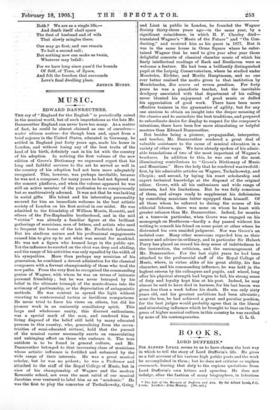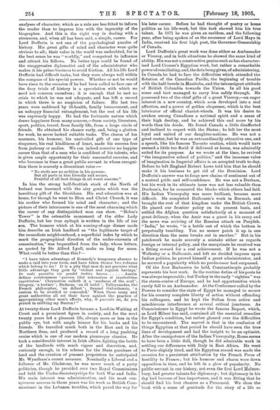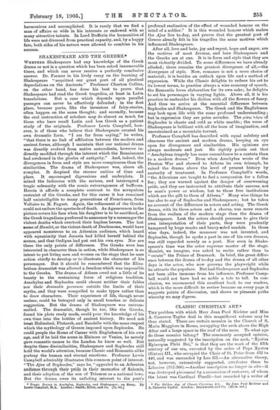LORD DUFFERIN.* SIR ALFRED ',FILL seems to us to have
chosen the best way in which to tell the story of Lord Dufferin's life. He gives us a full account of his various high public posts and the work he accomplished in them ; but he does not criticise or explain overmuch, leaving that duty to the copious quotations from Lord Dufferin's own letters and speeches. He does not indulge, after the fashion of many biographers, in laborious
* Th4 We Of tile Marquis of Dufferin and Ara. By Sir Allred ',pill, P.C. 2 vola, London ; Jobu Murray. [3611. ust.3
strenuous, and, when all has been said, a simple, career. For Lord Dufferin is not one of the psychological puzzles of history. His great gifts of mind and character were quite obvious to all ; their value in the world was undoubted, for in the best sense he was "worldly," and competent to influence and attract his fellows. No better type could be found of the unaggressive diplomatist and of the administrator who makes it his prime business to avoid friction. All his life Lord Dufferin had difficult tasks, but they were always well within the compass of his special powers. Whether or not be would have risen to the occasion if he had been called to face one of the fiery trials of history is a speculation with which we need not concern ourselves ; it is enough that he met no crisis to which he was not adequate, and has left a record in which there is no suspicion of failure. His last two years were saddened by ill-health, family bereavement, and an unhappy financial entanglement, but the rest of his life was supremely happy. He had the fortunate nature which draws happiness from many sources,—from society, literature, sport, politics, travel, from family life, from a large circle of friends. He obtained his chance early, and, being a glutton for work, he never lacked suitable tasks. The charm of his manners, his humour, his unrivalled gift of one type of eloquence, his real kindliness of heart, made his success free from jealousy or malice. We can indeed conceive no happier career than that of a man who is confident of his talents, who is given ample opportunity for their successful exercise, and who becomes in time a great public servant in whose recogni- tion there is scarcely a dissentient voice
No strife nor no sedition in his powers : But all parts in him friendly and secure, Fruitful of all best things in all worst seasons."
In him the strong half-Scottish stock of the North of Ireland was leavened with the airy genius which was the hereditary gift of the Sheridans. His real education was at home, for though he went to Eton and Christ Church, it was his mother who formed his mind and character ; and the picture of their intercourse is one of the most charming which the career of any distinguished man can show. "Helen's Tower" is the ostensible monument of the elder Lady Dufferin, but her true epitaph is written in the life of her son. The humour which at his coming-of-age dinner made him describe an Irish landlord as "the legitimate target of the immediate neighbourhood, a superficial index by which to mark the geographical direction of the under-currents of assassination," was bequeathed from the lady, whose letters,
as quoted by Sir Alfred Lyall, make us long for more. What could be better than this P— "I have taken advantage of Kennedy's temporary absence to make a raid into your room, and have taken thence two volumes which belong to me ! It is a pity that men do not perceive what little advantage they gain by 'violent and roguish havinge De male quaesitis viz gaudet tertius haeres Austin defines covetousness quarum tibet inhonestam et insatiabitem eupiditatem! Chrysostom calleth it a madness of the soul' ; Gregory, a torture '; Budaeus, an ill habit'; Talleyrandus, the French philosopher, un defaut ' ; Samuel Oxfordiensis, a custom to be avoided or concealed.' When these many and great authorities all set their faces against the practice of appropriating other men's effects, why, 0 puercule mi, do you persist in cribbing my Burton ? "
At twenty-three Lord Dufferin became a Lord-in-Waiting at Court and a prominent figure in society, and for the next twenty years led a pleasant life, always more or less in the public eye, but with ample leisure for his books and his friends. He travelled much both in the East and in the Northern Seas, and produced a record of a long yachting cruise which is one of our modern picaresque classics. He took a considerable interest in Irish affairs, fighting the battle of the landlords with much vigour and discretion, and, curiously enough, in his scheme for the State purchase of land and the creation of peasant proprietors he anticipated Mr. Wyndham's recent measure. Nominally a Liberal and a follower of Mr. Gladstone, he was never much of a party politician, though be presided over two Royal Commissions and held the Under-Secretaryships for both War and India. His main interest was administration, and his most con- spicuous success in those years was his work as British Com- missioner in the Lebanon troubles, which paved the way for his later career. Before he had thought of poetry or home politics as his life-work, but this task showed him his true talent. In 1871 he was given an earldom, and the following year, after being spoken of as the successor of Lord Mayo in India, received his first high post, the Governor-Generalship of Canada.
Lord Dufferin's great work was done either as Ambassador or Viceroy, and in both situations he showed the same kind of ability. His was not a constructive genius such as has character- ised Lord Cromer's Egyptian work, but rather a remarkable power of conciliating, and, the data being given, of administering. In Canada he had to face the difficulties which attended the flotation of the Canadian Pacific, the beginning of trouble with the half-breeds in Manitoba, and the intransigent attitude of British Columbia towards the Union. In all his good sense and tact managed to carry him safely through. He possessed two of the chief gifts of a great Viceroy,—an eager interest in a new country, which soon developed into a real affection, and a power of golden eloquence, which is the best lubricator of official chariot-wheels. It was his desire to awaken among Canadians a national spirit and a sense of their high destiny, and he achieved this end more by his words than his deeds. He found Canada a little disaffected and inclined to coquet with the States ; he left her the most loyal and united of our daughter-nations. He was not a great orator, but he was an extraordinarily attractive one, and a speech, like his famous Toronto oration, which would have seemed a little too florid if delivered at home, was admirably suited for its purpose. As we wrote at the time, he revived "the imaginative school of politics," and the immense value of imagination in Imperial affairs is an accepted truth to-day. Before he left England Robert Lowe told him that he should make it his business to get rid of the Dominion. Lord Dufferin's answer was to forge new chains of sentiment out of a mutual pride and self-confidence. He was not a Durham, but his work in its ultimate issue was not less valuable than Durham's, for he cemented the blocks which others had laid. His Indian Viceroyalty was more brilliant, because more difficult. He completed Dalhousie's work in Burmah, and brought the rest of that kingdom under the British Crown. He placed our frontier policy on its present basis, and settled the Afghan question satisfactorily at a moment of great delicacy, when the Amir was a guest in his camp and the news was arriving of the Russian attack on Penjdeh. "India," he wrote, "is a kettle out of which the bottom is perpetually tumbling. You no sooner patch it up in one direction than the mess breaks out in another." But in his patchwork he made scarcely a mistake either as regards foreign or internal policy, and the marquisate he received was a fitting reward for a real achievement. If he was not a Wellesley or a Dalhousie, and left no decided impress upon Indian politics, he proved himself a great administrator, and he secured a popularity which no predecessor had surpassed.
Of the four Embassies he held, Constantinople probably represents his best work. In the routine duties of his posts he was always impeccable ; but Turkey in the early " eighties " was the storm-centre of Europe, and he had opportunities which rarely fall to an Ambassador. At the Conference called by the Powers to consider the state of Egypt he managed to secure for his country complete liberty of action without offending his colleagues, and he kept the Sultan from active and mischievous interference at several critical junctures. As Commissioner in Egypt he wrote the famous Report, which, as Lord Milner has said, contained all the essential remedies for Egypt's condition, but rather glossed over the difficulties to be encountered. The marvel is that in the confusion of things Egyptian at that period he should have seen the true lines of development and had the insight to be an optimist. After the omnipotence of the Indian Viceroyalty, Rome seems to have been a little dull, though be did admirable work in settling our differences with Italy in East Africa. He went to Paris slightly tired, and his Egyptian record was made the occasion for a persistent attribution by the French Press of hostility to France ; but his humour and charm wore down opposition in time, and he left in a glow of popularity. No public servant in our history, nob even the first Lord Mimes- bury, had greater talents for diplomacy; but diplomacy in his day had become of less importance, and it was fitting that he should find his best chances as a Proconsul. We close the book with a sense of gratitude for the story of a life so
harmonious and accomplished. It is rarely that we find a man of affairs so wide in his interests or endowed with so many attractive talents. In Lord Dufferin the humanities of life were not divorced from practical capacity, and, by a happy fate, both sides of his nature were allowed to combine in his success.
SHAKESPEARE AND THE GREEKS.* WHETHER Shakespeare had any knowledge of the Greek








































 Previous page
Previous page